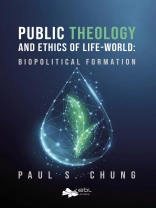Through an elaboration of public theology with an ethical project of life-world, Paul S. Chung employs the sociological work of civil society, public moral reasoning, and bio-political inquiry, while undertaking a social scientific analysis of a capitalist revolution in the global empire. Chung’s approach to public theology and ethical deliberation of the life-world opens up avenues for the postcolonial significance of the theology of nature and gene-ethics engaged in biomedical technology and bio-political governance in the time of the pandemic. Public Theology discloses creative new facets of sociological, ethical investigation into cultural justice (race, gender, and sexuality) through discourse clarification of power relations and construction of the life-world.
’Engaging in an expansive conversation with the thought of major figures in philosophy, political economy, and theology, Paul Chung articulates a compelling argument for a public theology that takes seriously our postcolonial context.’
– Craig L. Nessan, Professor of Contextual Theology and Ethics, Wartburg Theological Seminary. Dubuque, Iowa
’What does political and emancipatory public theology look like and does it function in a post-colonial reality? Interrogating foundational sources in ethics, theology, sociology, and epistemology, Dr. Chung makes a resounding case for Christian public theology as explicitly ethical theology. He demonstrates the profound importance of religiously articulated ethical guidance – for individuals, and the Church – to promote true solidarity and democracy, and justice-oriented mutual responsibility in Civil Society. Dr. Chung’s excavation of some of the root causes and frameworks of oppression invites deep and theologically informed engagement in the affairs of the world.’
Innehållsförteckning
Table of Contents
Introduction11
Chapter 1. Public Ethics, Life-World, and Human Body 27
1. Ethical Theology in the Public Sphere28
2. Theology and Social Scientific Approach44
3. Discourse Ethics, Biopolitics, and Human Body56
Chapter 2. Public Ethics, Interpretation, and Responsibility67
1. Responsible Self68
2. Responsible Self and the Other87
3. H. R. Niebuhr: Sin and Salvation94
Chapter 3. Colonialism, Hegel’s Dialectics, and Empire107
1. Postcolonial Hegel: Recognition and Struggle108
2. Christian Public Theology and Hegel131
3. Biopolitical Formation: Colonial Racism and Sovereignty139
4. Global Racism, Negative Dialectics, and Dictatorship152
Chapter 4. Prophetic Public Theology: Political and Emancipatory171
1. Political Theology and Public Theology172
2. Class Struggle, Politics of Eschatology, and Civil State193
3. Liberation Theology and Postcolonial Significance206
4. Public Theology and Critical Epistemology217
Chapter 5. Biopolitical Sociology: Late Capitalism and Global Empire245
1. Capitalist Revolution: Scientific Technology and Ecology 246
2. Biopolitical Sociology: State Apparatuses and Capital Accumulation260
3. Eurocentric Position: World System and Structure of Imperialism273
4. Globalization, Neocolonial Condition, and Biopolitical Sociology282
5. A Biopolitical State, Racism, and Theology300
Chapter 6. Public Ethics, Biopolitics, and Biomedical Justice 309
1. Theological Deliberation of Biomedical Field310
2. Biomedical Science and Ethical Interpretation317
3. Biopolitical Time, Human Dignity, and Practical Solidarity329
4. Theological Construction, Evolution, and Biomedical Science331
Conclusion347
Afterword: Genealogy of Jeju 4.3 Massacre and Biopolitics359
Jeju 4.3 Event as Effective History362
Epilogue379
Bibliography381
Journal396
Internet Resources397
About the author401
Index403












